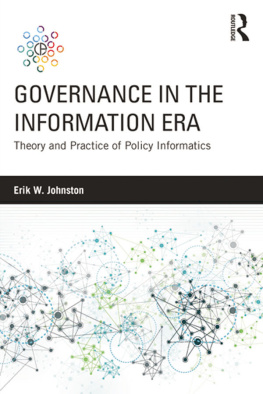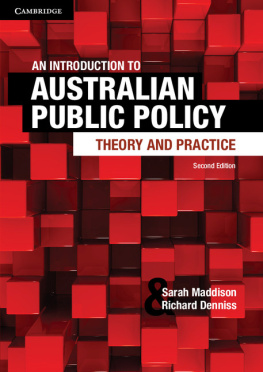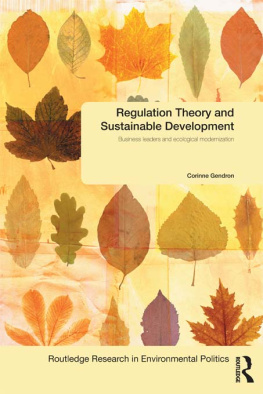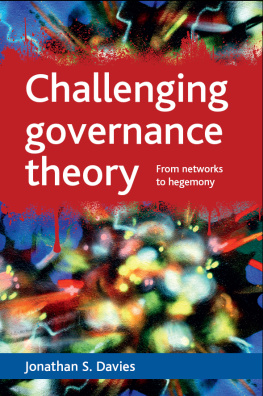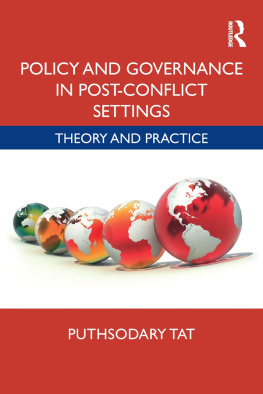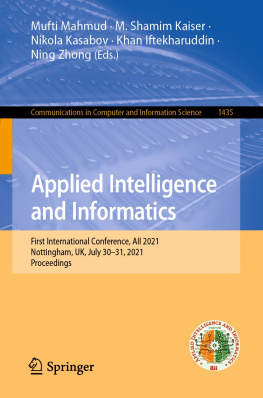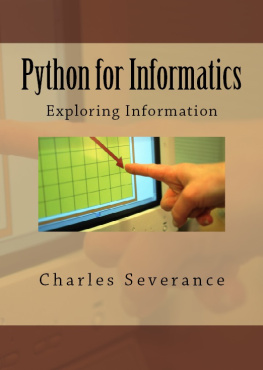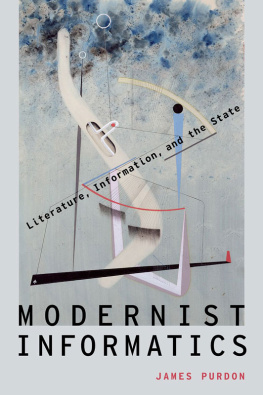Governance in the Information Era
Policy informatics is addressing governance challenges and their consequences, which span the seeming inability of governments to solve complex problems and the disaffection of people from their governments. Policy informatics seeks approaches that enable our governance systems to address increasingly complex challenges and to meet the rising expectations of people to be full participants in their communities. This book approaches these challenges by applying a combination of the latest American and European approaches in applying complex systems modeling, crowdsourcing, participatory platforms, and citizen science to explore complex governance challenges in domains that include education, environment, and health.
The traditional norms of hierarchical governance, expert-driven decision-making, institutional control, and centralization have begun to fade as the costs of community engagement have declined, data have become increasingly available and accessible, and computational and analytical skills have increased dramatically. Further, stakeholders and publics are becoming more diverse, unequal, vocal, and polarized. Against this backdrop, the book explores how to enable public values to flourish by promoting new forms of effective governance and exploring the changes necessary in technology, processes, institutional capacity, and social norms to realize that future.
Erik W. Johnston is the Director of the Center for Policy Informatics at Arizona State University and an Assistant Professor in the School of Public Affairs. He also holds joint or affiliated positions in Applied Mathematics for the Life and Social Sciences, the Center for the Study of Institutional Diversity, the School for Social Dynamics and Complexity, and the Decision Theater.
Governance in the Information Era
Theory and Practice of Policy Informatics
Edited by Erik W. Johnston
First published 2015
by Routledge
711 Third Avenue, New York, NY 10017
and by Routledge
2 Park Square, Milton Park, Abingdon, Oxon OX14 4RN
Routledge is an imprint of the Taylor & Francis Group, an informa business
2015 Taylor & Francis
The right of the editor to be identified as the author of the editorial material, and of the authors for their individual chapters, has been asserted in accordance with sections 77 and 78 of the Copyright, Designs and Patents Act 1988.
All rights reserved. No part of this book may be reprinted or reproduced or utilized in any form or by any electronic, mechanical, or other means, now known or hereafter invented, including photocopying and recording, or in any information storage or retrieval system, without permission in writing from the publishers.
Trademark notice: Product or corporate names may be trademarks or registered trademarks, and are used only for identification and explanation without intent to infringe.
Library of Congress Cataloging-in-Publication Data
Governance in the information era : theory and practice of policy
informatics / edited by Erik W. Johnston.
pages cm
1.Public administrationTechnological innovations.2.Communication in politicsTechnological innovations.3.Electronic government information.I.Johnston, Erik W., 1977 editor of compilation.
JF1525.A8.G6852015
352.3'84dc232014029227
ISBN: 978-1-138-83207-7 (hbk)
ISBN: 978-1-138-83208-4 (pbk)
ISBN: 978-1-315-73621-1 (ebk)
Typeset in Bembo
by Apex CoVantage, LLC
To R. F. Rick Shangraw, Jr.For his vision and support of policy informatics.
Contents
Part I
Introduction
Erik W. Johnston
Part II
The Basics
Sharon S. Dawes and Natalie Helbig
Anand Desai and Kristin Harlow
Evert Lindquist
Part III
Analysis
George P. Richardson
David Wheat
David N. Ford, Ivan Damnjanovic, and Scott T. Johnson
Navid Ghaffarzadegan, John Lyneis, and George P. Richardson
Christopher Bronk and Derek Ruths
Kimberly M. Thompson
Part IV
Administration
Christopher Koliba and Asim Zia
Nora H. Sabelli, William R. Penuel, and Britte H. Cheng
Petra Ahrweiler, Andreas Pyka, and Nigel Gilbert
William H. Dutton
Part V
Governance Infrastructure
Christopher Barrett, Stephen Eubank, Achla Marathe, Madhav Marathe, and Samarth Swarup
Gerard P. Learmonth, Sr. and Jeffrey Plank
Jes A. Koepfler, Derek L. Hansen, Paul T. Jaeger, John C. Bertot, and Tracy Viselli
Ines Mergel
Part VI
Conclusion
Justin Longo, Dara M. Wald, and David M. Hondula
I started my academic career at a pivotal time in the career of all academicsthe introduction of the personal computer. The personal computer transformed the way we analyzed data and conducted research. It also completely modified the process of compiling and writing research, not to mention fundamentally changed the way we conducted our academic administrative processes.
The introduction of the personal computer in the 1980s led to an explosion in research on the interactions between information technology and public management. Ken Kraemer at University of California, Irvine, Wil Gorr at Carnegie Mellon University, Stu Bretschneider at Syracuse University, David Garson at North Carolina State University, and several others led the way in defining this new field. Their work put a public sector twist on the management information systems (MIS) and decision support systems (DSS) research being conducted at business schools. Initially, most of the research focused on the effects of computing on public sector administrative and managerial processes, topics most Public Administration scholars considered mostly descriptive at its core and mundane at best.
Another transition occurred again in the late 1990s with the rise of the Internet. This period fractured the young field of computing and public management. The Internet gave rise to new lines of research, including participatory democracy (or e-democracy), equity and access to Internet-based public services, the effectiveness and efficiency of e-government, and the effects of the Internet on bureaucratic politics. Research on information and communication technologies essentially dissolved as a distinct discipline and integrated into most mainstream public administration disciplines.
When all this was happening, I was a private sector practitioner providing policy and management strategy consulting services to Federal agencies and Fortune 500 companies. It was a time of significant growth in the information technology industry. The academic literature was racing to keep up with dramatic changes occurring in the delivery and management of public services. However, as we moved into the new century, attention increasingly shifted to the role of information and communications technology in the formulation of public policy. Information technologies were being used to design, analyze, evaluate, implement, and even influence the adoption of policies (at the intersection with politics).
When I reentered academia in 2005 and came to Arizona State University (ASU), the field of public management information systems was still splintered. At ASU we addressed this by creating the Center for Policy Informatics, intended to bring definition to the field and distance it from more traditional, descriptive research. We also adopted new techniques such as simulationsparticularly agent-based modelsto reimagine the way we study complex public policy and management issues. For example, the intersection of complexity sciences with public policy and management is leading to a number of insights into very perplexing public policy issues. Initially at ASU, we took a very informatics-centric approach and defined policy informatics as the study of techniques, methods, and theories related to the storage, retrieval, sharing, and optimal use of policy data, information, and knowledge for problem solving and decision-making. However, over the past decade, this definition has continued to evolve and is best articulated in several of the works in this volume.


